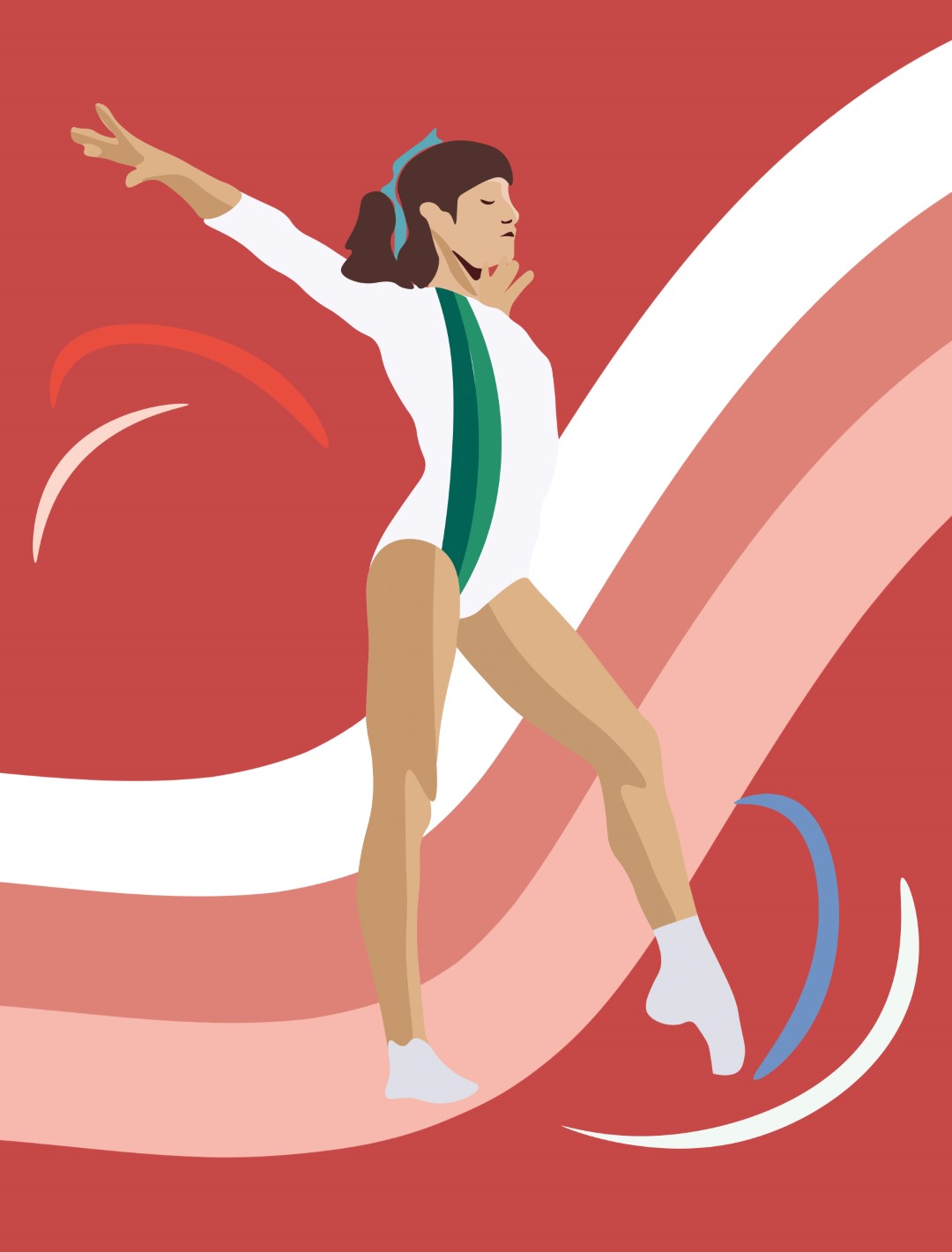
Nadia Comăneci was simply perfect
By Brandon Yip, Senior Columnist
“Be your authentic you, your version of your ‘perfect 10.’”
– Nadia Comăneci, Romanian Olympic gold medalist
Nadia Comăneci would become a household name after her stunning performance at the 1976 Olympics in Montreal. At the age of 14, Comăneci became the first gymnast in Olympic history to score a perfect 10.
She was born on November 12, 1961, in Onești, Romania to father Gheorghe (1936-2012), mother Ștefania, and a younger brother named Adrian. In a November 2011 interview with the Romanian newspaper, Libertatea, Stefania stated she enrolled Nadia into gymnastics as a way to control her rambunctious energy: “I took her to a gym for the first time because she was an energetic child, and you couldn’t stay with her in the house anymore. [She] was making a mess, ruining the arches of the bed.”
Comăneci first began training in gymnastics at age six to later be discovered by Bela Karolyi (who later coached the Romanian gymnastics team). At age nine, she became the youngest gymnast to win the Romanian Nationals. In 1971, she competed in her first international event: a dual junior competition meets between Yugoslavia and Romania. Comăneci would win her first all-around title while also helping her team achieve gold. As a senior, she won the European Championships in 1975 and the American Cup in 1976.
But the 1976 Olympics in Montreal is where she would be catapulted into the international spotlight; she is the first gymnast to score a perfect 10 at the Olympics (in the uneven bars). She earned an additional six perfects 10s (seven in total), along with three gold medals, a bronze, and silver. She became adored by millions worldwide and was affectionately known simply as “Nadia.” She even had a song dedicated to her, “Nadia’s Theme,” and it originally was the theme for the CBS soap opera, The Young and the Restless, composed by the late Perry Botkin Jr. and Barry De Vorzon.
After Comăneci made history, the showing of her perfect score was anything but perfect. In 1976, the scoreboard was only able to accommodate three digits (for example 9.99). Comăneci’s score could not be shown, instead 1.0 was displayed to compensate. “I looked around to see what was going on and then I saw the problem or whatever was happening with the scoreboard,” Comăneci laughed during an interview with Olympics.org in January 2019. “I didn’t understand it, but I was like, whatever it is, it’s something wrong so I am just going to concentrate on my next event. One of my [teammates] said, ‘I think it is a 10 or there is something wrong with the scoreboard.’ I knew at least I was going to get a 9.9—because a 1.0 was way too low.”
According to the previously mentioned article, the inability to show Comăneci’s “10” score is considered one of the most well-known technical lapses in history. OMEGA, the Olympic Games official scorers and timekeepers since 1932, had asked organizers prior to the 1976 Olympic Games if the scoreboards needed to be upgraded to accommodate four digits. Organizers told OMEGA that an upgrade was not needed.
Afterwards, Comăneci’s triumph at the Olympics would be celebrated; she appeared on the covers of Time, Sports Illustrated, and Newsweek… and all in the same week. She later competed in the 1980 Olympics in Moscow. Comăneci won another two gold medals and two silvers, and her total Olympic medals added up to nine (five gold, three silver, and one bronze). She retired from competition in 1984 and was later inducted into the International Gymnastics Hall of Fame in 1996. In April 1996, she married American Olympic champion Bart Conner in a state wedding held in Bucharest, Romania. The couple has a son, Dylan, who was born in June of 2006.
Comăneci lived in Romania during communist rule, compounded by the repressive years led by dictator Nicolae Ceausescu and his brutal regime. But in the years following her triumphant Olympic performance in Montreal, her fame and success became more of a burden than a blessing in her homeland. Her movements were restricted and frequently monitored by the government. It appeared that the only time Comăneci had freedom and was in control of her own fate was on the gymnastics floor.
In late November 1989, Comăneci fled Romania and defected to the US shortly before the start of a violent uprising and battle (Romanian Revolution). She arrived in New York on December 1 as reported by the Associated Press. Comăneci discussed her ordeal to the Chicago Tribune in July 1990 living under Ceausescu’s rule and her escape to find freedom in the US: “I need more time. It is not so easy to cross the border. If you were not born in a communist country, if you were born in a free country, it is hard to understand what this means, to cross the border. Only now I realize what I did a few months ago. I need time to put my feet on the ground. I need an adaptation. If you were in a closed country like mine, you didn’t realize what was happening around the world.”
Notably, in 1992, Comăneci made an appearance at Coquitlam Centre at the then Woodward’s department store (location is now Accents@home furniture store). It was part of a promotion for Jockey. Preston Yip, a retired Port Coquitlam high school teacher and photographer, was at Woodward’s covering the event. He remembered Comăneci’s athleticism and physique stating in an interview with the Other Press: “She was not very tall. But I was overwhelmed by her thigh muscles, which [reflected] her tremendous strength from all that training that made her such a great gymnast and champion.”
Comăneci, in a statement to the Other Press, reflected on her historic accomplishment 45 years ago in Montreal: “Scoring the first 10 in history was a big deal, but the fact that even the electronic scoreboards could not display that score made the story much more historic. Even though I was too young to realize the history I made then, as I look back now, I am really thankful to my parents and everyone who helped me achieve history [through] hard work and discipline. Every year on July 18, I get emotional when people around the world send me congratulations on the anniversary of the first perfect 10. I feel that Nadia, Romania, gymnastics, and Montreal will be tied together forever. Happy International Women’s Day. Be your authentic you, your version of your ‘perfect 10.’”


